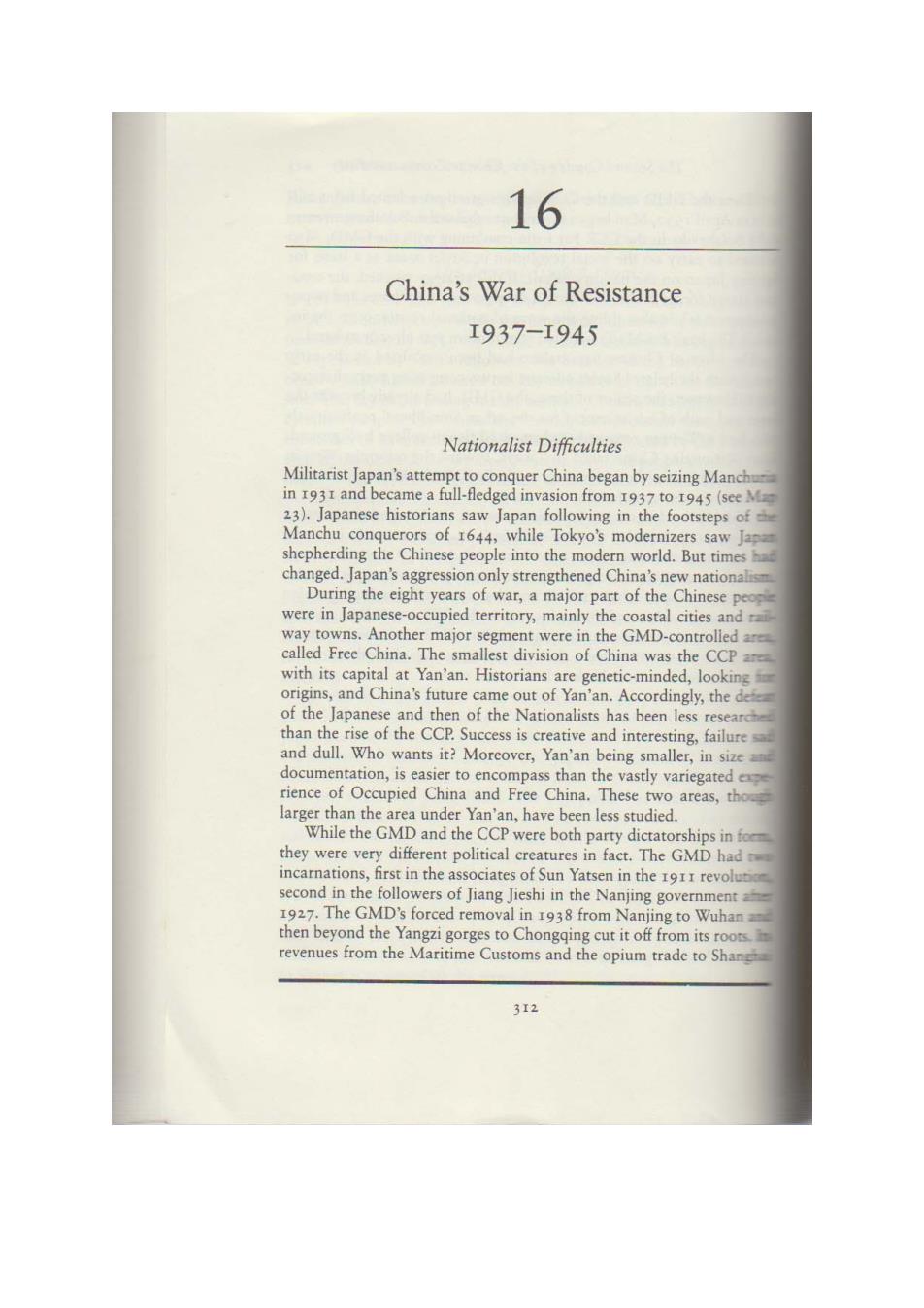
16 China's War of Resistance I937-I945 Nationalist Difficulties Militarist Japan's attempt to conquer China began by seizing Manch in I93 I and became a full-fledged invasion from I937 to 1945(see M 23).Japanese historians saw Japan following in the footsteps of Manchu conquerors of 1644,while Tokyo's modernizers saw Ja shepherding the Chinese people into the modern world.But times changed.Japan's aggression only strengthened China's new nationalis- During the eight years of war,a major part of the Chinese peo were in Japanese-occupied territory,mainly the coastal cities and way towns.Another major segment were in the GMD-controlled a called Free China.The smallest division of China was the CCPa with its capital at Yan'an.Historians are genetic-minded,looking origins,and China's future came out of Yan'an.Accordingly,the de of the Japanese and then of the Nationalists has been less researd than the rise of the CCP.Success is creative and interesting,failure and dull.Who wants it?Moreover,Yan'an being smaller,in size documentation,is easier to encompass than the vastly variegated rience of Occupied China and Free China.These two areas,tho larger than the area under Yan'an,have been less studied. While the GMD and the CCP were both party dictatorships in fo they were very different political creatures in fact.The GMD had incarnations,first in the associates of Sun Yatsen in the I9Ir revolu second in the followers of Jiang Jieshi in the Nanjing government 1927.The GMD's forced removal in I938 from Nanjing to Wuhan then beyond the Yangzi gorges to Chongqing cut it off from its roots revenues from the Maritime Customs and the opium trade to Shan 3I2

China's War of Resistance 313 eknocked out.Its hard-won echelon of modern-trained administra- became refugees.From being the central government of China,the onalist regime was now a fugitive in a mountain-ringed redoubt, ged to work with reactionary provincial militarists and landlords.In sChina the Chongqing government tried to keep the local warlords e and avoid upsetting the social order in the villages. China's nascent sino-liberal educational system suffered a grievous ruction of plant and facilities.Missionary colleges kept at work er the Japanese occupation but in purely Chinese universities many ents and faculties migrated in 1937-1938 up the Yangzi or to the hwest.The Southwest Associated University at Kunming was set up Qinghua(Tsing Hua)University and Beijing University from Beijing Nankai University from Tianjin.Meanwhile,Yanjing University other Christian institutions,after the Japanese attacked the United in December 1941,gathered at the site of the West China Union ersity in Chengdu.Whole industrial plants were dismantled and ped upriver,where the National Resources Commission had already developing mines and industries.Intellectuals and government ad- trators,with great patriotism,put up with displacement from their and learned to live primitively in the interior.Unfortunately,al- h they were the main body of modern China's professional people, hopes went unrewarded.This was due partly to the ineptitude of government. ith admirable fortitude but little foresight,the Nationalist regime ts problem by short-term expedients that gave it little strength for ture.The Chongqing government got control of the land tax in as the wherewithal to feed its administration.Its industrial devel- had arsenals at work to support the war.The spirit of resistance stimulated by the Japanese bombing of Chongqing,but meanwhile spirit of the united front deteriorated.Radical intellectuals in gqing began to drift northward to Communist Yan'an,except for who were already "outside cadres"of the CCP assigned to work sensible liberals in the GMD area.The secret police of both the and the government felt more and more compelled to keep the s in line as potential subversives.Strong-arm methods against stu- publishers,and other seeming enemies steadily widened the split en the intellectuals and the government that hoped to rely upon for the future. ang Jieshi's regime was as unimaginatively conservative in Chong-
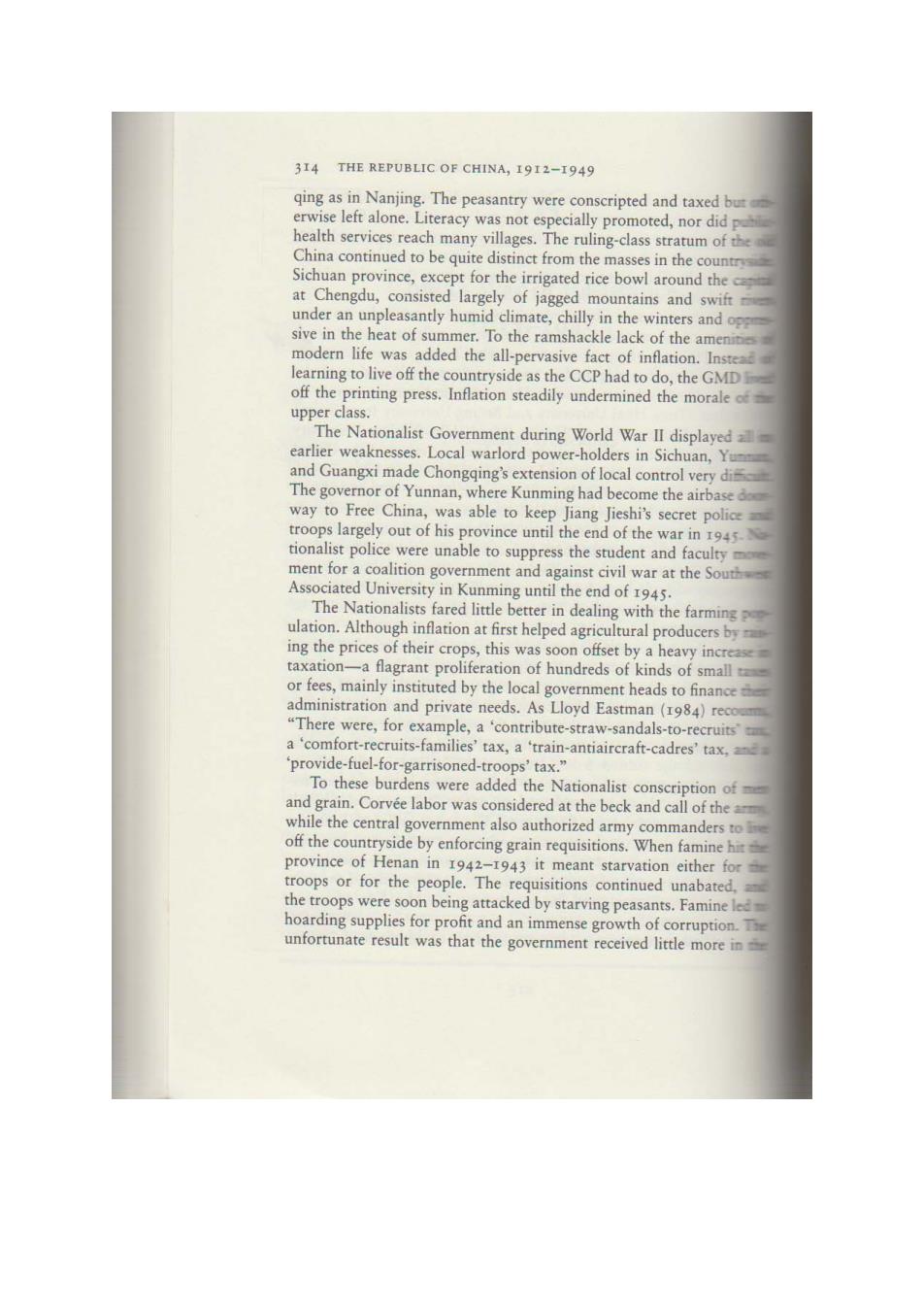
314 THE REPUBLIC OF CHINA,1912-1949 qing as in Nanjing.The peasantry were conscripted and taxed but erwise left alone.Literacy was not especially promoted,nor did p health services reach many villages.The ruling-class stratum of the China continued to be quite distinct from the masses in the countr Sichuan province,except for the irrigated rice bowl around the c at Chengdu,consisted largely of jagged mountains and swift under an unpleasantly humid climate,chilly in the winters and op sive in the heat of summer.To the ramshackle lack of the amenin modern life was added the all-pervasive fact of inflation.Instea learning to live off the countryside as the CCP had to do,the GMD off the printing press.Inflation steadily undermined the morale upper class. The Nationalist Government during World War lI displayed earlier weaknesses.Local warlord power-holders in Sichuan,Yu and Guangxi made Chongqing's extension of local control very di The governor of Yunnan,where Kunming had become the airbase d way to Free China,was able to keep Jiang Jieshi's secret police troops largely out of his province until the end of the war in 1945 tionalist police were unable to suppress the student and facultym ment for a coalition government and against civil war at the South Associated University in Kunming until the end of 1945. The Nationalists fared little better in dealing with the farming ulation.Although inflation at first helped agricultural producers by ing the prices of their crops,this was soon offset by a heavy increase taxation-a flagrant proliferation of hundreds of kinds of small or fees,mainly instituted by the local government heads to finance administration and private needs.As Lloyd Eastman(1984)recc "There were,for example,a 'contribute-straw-sandals-to-recruits' a 'comfort-recruits-families'tax,a 'train-antiaircraft-cadres'tax, provide-fuel-for-garrisoned-troops'tax." To these burdens were added the Nationalist conscription of and grain.Corvee labor was considered at the beck and call of the a while the central government also authorized army commanders to off the countryside by enforcing grain requisitions.When famine hi province of Henan in 1942-1943 it meant starvation either for troops or for the people.The requisitions continued unabated, the troops were soon being attacked by starving peasants.Famine le hoarding supplies for profit and an immense growth of corruption.T unfortunate result was that the government received little more in

and its claimed territories in 1933 U.S.S.R. t of occupation,1937 SAKHALIN t of occupation,1938 t of occupation,1939 est extent of Japanese conques =Cna,1942 MONGOLIA 一… aotou Beijing Sea of Japan Tanggu JAPAN Xining Yan'an NDO Qingdao Xi'an aifeng SU Cheng Shanghai Ningbo Changsha Nancha East China Sea Kunming Xiamen ou .Guilin RYUKYU Guan安 TAIWAN Shantou Hanoi Hong Kong UK HAINAN ea LAND FRENCH INDO-CHINA South China Manila PHILIPPINE ISLANDS Pacific Ocean Saigon BRUN史 ORN Singapore SARAWAK CELEBES 020040060000km DUTCH EAST InDIES R.Forget 23.The Japanese Invasion of China

316 THE REPUBLIC OF CHINA,I9I2-1949 way of resources while the petty officials and landlords found out how to profit in the inflation.By the war's end,peasant rebellions were is cipient in several provinces of Free China. Meanwhile,both the Nationalist Government at Chongqing and the CCP at Yan'an fought a two-front war,against Japan and against eac other.The war against Japan that had begun outside Beijing on July- 1937,led to the announcement in August and September of a unite front agreement between the CCP and the GMD.The CCP agreed stop its armed revolution to change Chinese society and gave upth forcible confiscation of landlords'land,while its Red Army would be placed under central government command.On its part,the GMD would let the CCP establish liaison offices in several cities,publish New China Daily in Chongqing,and be represented in GMD adviso bodies.From this time on,the form of the united front was maintaine The Red Army was now called the Eighth Route Army,and Zhou Enla resided in Chongqing to represent it.Having spent 1938 at the trans tional capital in Wuhan,he was already the CCP's foreign ministera representative to the world press. The terms of the united-front agreement remained on paper unch lenged,but in fact developments undid it.Yan'an refused to have Na tionalist staff officers in its area.In effect,the Eighth Route Army con ued to be an independent force in spite of a small subsidy from Nationalists.Meanwhile,the CCP in building up its base areas ma tained order,encouraged economic production through devices such mutual-aid teams,and kept on recruiting poor peasant activists, would eventually get the upper hand over the rich peasants.Party me bership grew from some 40,ooo claimed in 1937 to an alleg I,200,ooo in 1945,while the armed forces increased from 92,oo0 1937 to perhaps 91o,ooo in 1945. Mao's Sinification of Marxism To control and direct the widespread organization of the CCP mo ment over the broad stretches of North China required dedicated disciplined party members,experienced cadres(activists)in the villag an attempt at self-sufficiency in each base,and the use of radio teleg phy to transmit messages.The principle of centralized control over decentralized situation was exhibited in the government organiza The Central Committee of the party had its departments at Yan'an d ing with military affairs,organization,united-front work,ene

326 THE REPUBLIC OF CHINA,1912-1949 by one's ideas and aspirations.Similarly,the people were enshrined a the final arbiters and beneficiaries of the revolution,but some perso could be labeled as enemies of the people.This could be done by admi istrative fiat from above. It was typical of this line of development that Mao should defi contradictions as being some of them antagonistic and some of the nonantagonistic,that is,arguable.Thus some contradictions made yo an enemy of the people and some did not,depending on how you we perceived.All in all,it was a very flexible structure of ideas,as thou Marx and Engels had been seduced by Yin and Yang.Once Mao ha control over it,he was truly in a position of leadership.Unity result because those who held out against Mao were vilified,penalized,jaile or even executed. American Support of Coalition Government In 1943 the Soviets successfully defended Stalingrad,the Western A won North Africa,the U.S.Navy began to get the upper hand in Pacific,and American forces had invaded the Solomon Islands on th way to Tokyo.The Japanese had to relax their pressure on the No China Liberated Areas and Border Region.For the Communists the began to wind down when the long-planned Japanese Ichigo offens in 1944 rolled down from Henan to the south of the Yangzi,destrov much of the Nationalists'best armies. In these circumstances CCP expansion was resumed in the pero 1943-1945,but its policy was prudent and avoided haste and supe ciality.By the time the American Army military observer group,or called Dixie Mission,reached Yan'an in mid-1944,the CCP was on upswing again and preparing for the postwar showdown with GMD.This resurgent spirit was indicated in the important Seventh C gress of the Chinese Communist Party held in Yan'an from late Apr mid-June 1945.It adopted a new constitution,which gave Maom central power as chairman of the Central Committee and Political reau."The Thought of Mao Zedong"was hailed as the party's guide By this time the United States had willy-nilly become an impor factor in Chinese politics.To distant outsiders like the Americans,F China represented an outpost of modern civilization struggling to vive in a sea of antique customs and evil forces.There was no lo anything revolutionary about it,but the Americans found this enc aging and after 194I adopted Free China as an ally.American ignor
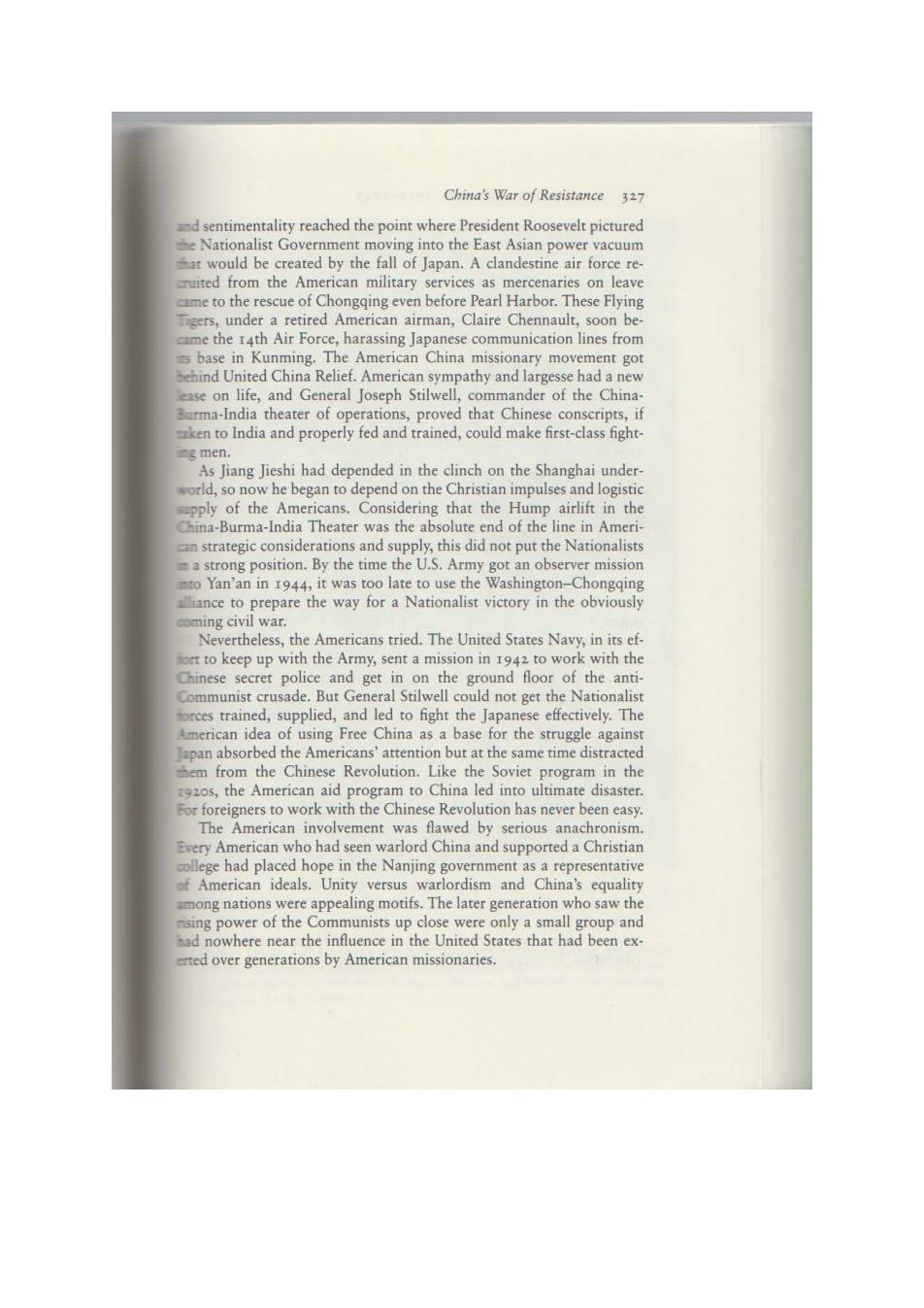
China's War of Resistance 327 d sentimentality reached the point where President Roosevelt pictured eNationalist Government moving into the East Asian power vacuum at would be created by the fall of Japan.A clandestine air force re- uited from the American military services as mercenaries on leave me to the rescue of Chongging even before Pearl Harbor.These Flying Tgers,under a retired American airman,Claire Chennault,soon be- me the I4th Air Force,harassing Japanese communication lines from s base in Kunming.The American China missionary movement got hind United China Relief.American sympathy and largesse had a new ease on life,and General Joseph Stilwell,commander of the China- Burma-India theater of operations,proved that Chinese conscripts,if ken to India and properly fed and trained,could make first-class fight- g men. As Jiang Jieshi had depended in the clinch on the Shanghai under- orld,so now he began to depend on the Christian impulses and logistic pply of the Americans.Considering that the Hump airlift in the China-Burma-India Theater was the absolute end of the line in Ameri- n strategic considerations and supply,this did not put the Nationalists a strong position.By the time the U.S.Army got an observer mission to Yan'an in 1944,it was too late to use the Washington-Chongqing iance to prepare the way for a Nationalist victory in the obviously oming civil war. Nevertheless,the Americans tried.The United States Navy,in its ef- t to keep up with the Army,sent a mission in 1942 to work with the Chinese secret police and get in on the ground floor of the anti- Communist crusade.But General Stilwell could not get the Nationalist rces trained,supplied,and led to fight the Japanese effectively.The American idea of using Free China as a base for the struggle against apan absorbed the Americans'attention but at the same time distracted em from the Chinese Revolution.Like the Soviet program in the sos,the American aid program to China led into ultimate disaster. For foreigners to work with the Chinese Revolution has never been easy. The American involvement was flawed by serious anachronism. Every American who had seen warlord China and supported a Christian college had placed hope in the Nanjing government as a representative fAmerican ideals.Unity versus warlordism and China's equality among nations were appealing motifs.The later generation who saw the sing power of the Communists up close were only a small group and ad nowhere near the influence in the United States that had been ex- erted over generations by American missionaries
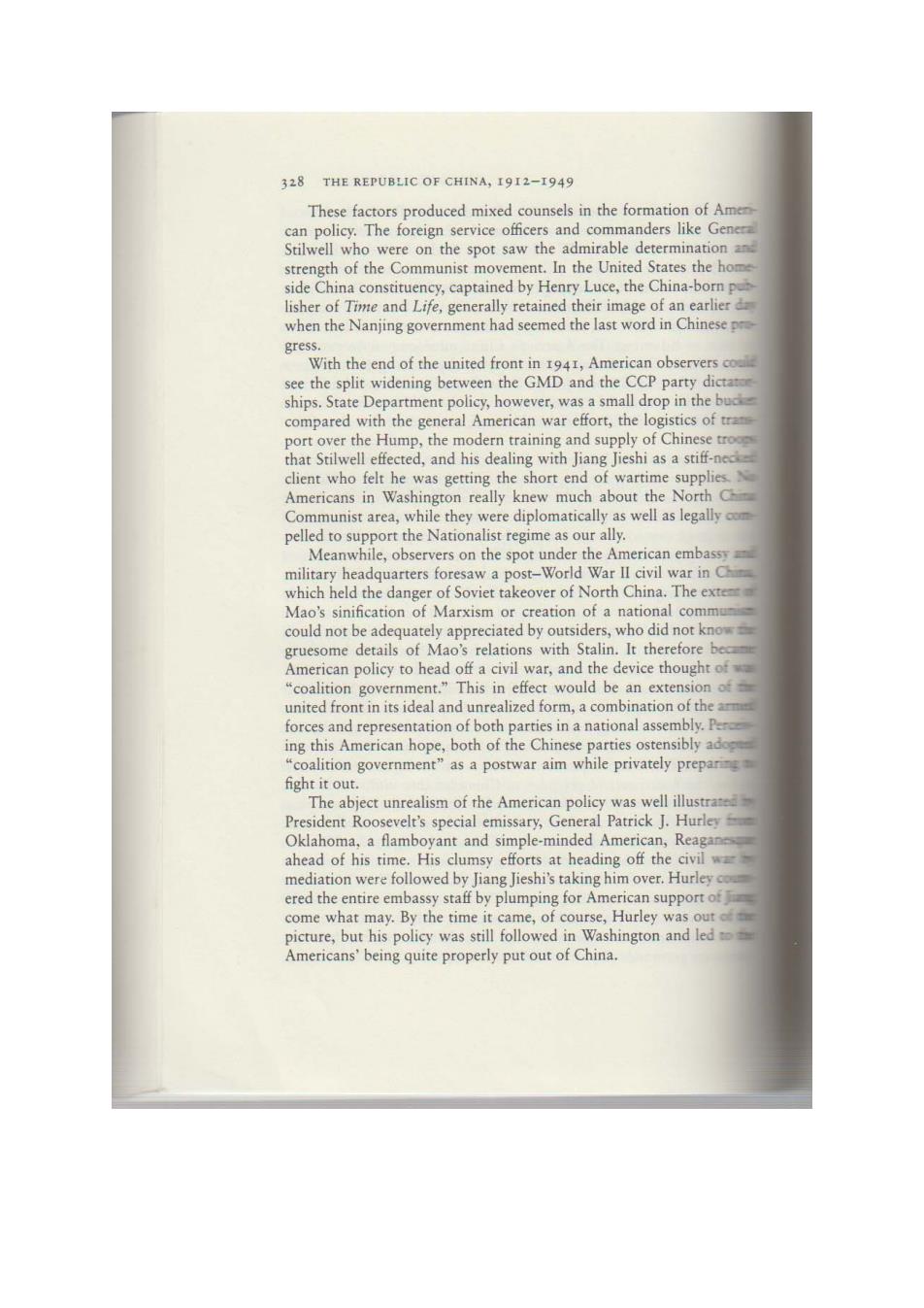
328 THE REPUBLIC OF CHINA,I9I2-1949 These factors produced mixed counsels in the formation of Ame can policy.The foreign service officers and commanders like Genera Stilwell who were on the spot saw the admirable determination an strength of the Communist movement.In the United States the home side China constituency,captained by Henry Luce,the China-born p lisher of Time and Life,generally retained their image of an earlier when the Nanjing government had seemed the last word in Chinese p gress. With the end of the united front in 1941,American observers co see the split widening between the GMD and the CCP party dicta ships.State Department policy,however,was a small drop in the buc compared with the general American war effort,the logistics of tra port over the Hump,the modern training and supply of Chinese tro that Stilwell effected,and his dealing with Jiang Jieshi as a stiff-nec client who felt he was getting the short end of wartime supplies Americans in Washington really knew much about the North C Communist area,while they were diplomatically as well as legally co pelled to support the Nationalist regime as our ally. Meanwhile,observers on the spot under the American embassy military headquarters foresaw a post-World War II civil war in Ch which held the danger of Soviet takeover of North China.The exte Mao's sinification of Marxism or creation of a national commu could not be adequately appreciated by outsiders,who did not kno gruesome details of Mao's relations with Stalin.It therefore bec American policy to head off a civil war,and the device thought of "coalition government."This in effect would be an extensionof united front in its ideal and unrealized form,a combination of the a forces and representation of both parties in a national assembly.P ing this American hope,both of the Chinese parties ostensibly ade "coalition government"as a postwar aim while privately prepar fight it out. The abject unrealism of the American policy was well illustrase President Roosevelt's special emissary,General Patrick J.Hurley Oklahoma,a flamboyant and simple-minded American,Reagan ahead of his time.His clumsy efforts at heading off the civil wa mediation were followed by Jiang Jieshi's taking him over.Hurley co ered the entire embassy staff by plumping for American support ot come what may.By the time it came,of course,Hurley was out picture,but his policy was still followed in Washington and led Americans'being quite properly put out of China

China's War of Resistance 329 After Japan's surrender in August 1945,Jiang and Mao under Hur- 's auspices met in Chongqing and in October agreed upon an ideal set principles that would gladden any liberal in the world.The GMD and CCP regimes would cooperate in a representative assembly,scrambling eir armies and meanwhile guaranteeing all civil liberties and good ngs dear to the hearts of men and women everywhere.This make- lieve derived from the recognition that neither side could take a stand ainst the ideal of peace and cooperation. The hard facts in the fall of 1945 were far otherwise.As soon as the arwith Japan was ended,the Communist forces moved across North Cina to compel the Japanese to surrender to them.The Nationalists acted by ordering the Japanese to fight off the Communists and re- er from them any territories they had gained.Soon there were nu- rous Communist-Japanese firefights as the Nationalist Government de use of the ex-imperialist aggressors to fight off the social revolu- Meanwhile,both Nationalist and Communist forces were moving Manchuria(henceforth called the Northeast)in a competition to over the area.Typically the Nationalists garrisoned the cities and Communists mobilized the countryside. The United States government followed the Nationalist example by owing some 53,ooo U.S.Marines into North China to hold Beijing and njin against a possible Soviet incursion,while transporting by air and complete Nationalist armies to Manchurian cities and other parts North China.The United States thus intervened from the beginning the anti-Communist side.Moreover,as part of the Yalta agreement February 1945,President Roosevelt had already tried to settle China's by arranging with Stalin for a Chinese-Soviet treaty between the atonalists and the USSR.The terms were that the Soviets would rec- ize and deal only with the Nationalist Government of China,while Nationalists in turn acknowledged the Russian recovery of their for- imperialist rights in the Northeast along the railways.Stalin prom- edto withdraw Soviet troops within three months from the Japanese render.As it turned out,this would be November I5,1945,and thus CCP would have a three-month period in which to infiltrate the ortheast as best they could in competition with the Nationalists,who uld be transported by the Americans.Since the Nationalists saw that CCP even on foot was beating them into the Northeast,they asked Soviets to stay longer,and Soviet troops did not depart until May 46,taking with them much of the industrial equipment that could be ed from the new Japanese installations in their puppet state.Having
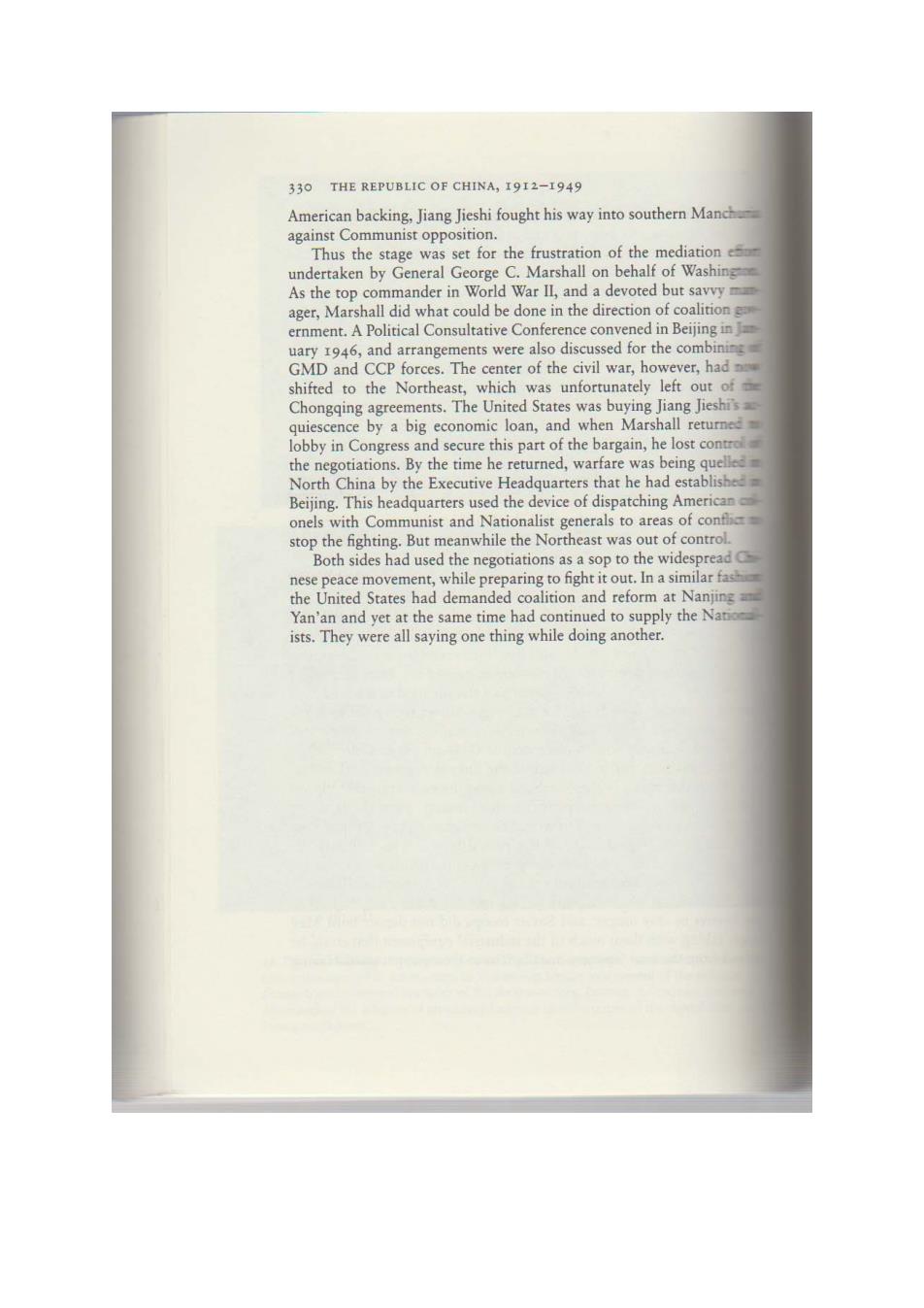
330 THE REPUBLIC OF CHINA,I912-1949 American backing,Jiang Jieshi fought his way into southern Manch against Communist opposition. Thus the stage was set for the frustration of the mediation e undertaken by General George C.Marshall on behalf of Washing As the top commander in World War II,and a devoted but savvy m ager,Marshall did what could be done in the direction of coalition ernment.A Political Consultative Conference convened in Beijingin uary 1946,and arrangements were also discussed for the combinin GMD and CCP forces.The center of the civil war,however,had shifted to the Northeast,which was unfortunately left out of Chongqing agreements.The United States was buying Jiang Jieshi's quiescence by a big economic loan,and when Marshall returne lobby in Congress and secure this part of the bargain,he lost contr the negotiations.By the time he returned,warfare was being quelle North China by the Executive Headquarters that he had establishe Beijing.This headquarters used the device of dispatching American onels with Communist and Nationalist generals to areas of conf stop the fighting.But meanwhile the Northeast was out of control. Both sides had used the negotiations as a sop to the widespread nese peace movement,while preparing to fight it out.In a similar fash the United States had demanded coalition and reform at Nanjing Yan'an and yet at the same time had continued to supply the Natio ists.They were all saying one thing while doing another